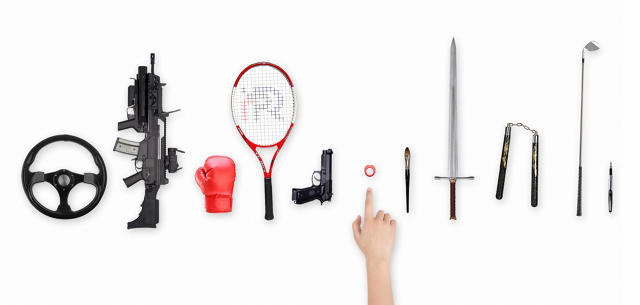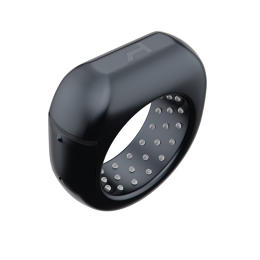Almost a decade ago, Nintendo unveiled the next big thing in game controllers: the Wiimote, a gyroscopic Bluetooth wand about the size of a ruler that allowed you to control video games across the room, just by waving your arm. It seemed cutting edge at the time, but now, a new company called Titanium Falcon thinks it can make a Wii-like motion controller small enough to wear as a ring.
It's called the Talon. Created by Juan Gao, a former game designer who previously worked at Gameloft on mobile series like Asphalt and Dungeon Hunter, the Talon is a nine-axis motion sensor you wear on your ring finger. When paired over Bluetooth with a video game console, computer, or mobile device, the Talon would allow you to control games just by waving your arms.

You could steer in a racing game by twisting an invisible wheel in front of you, or return a serve in tennis by making an invisible backstroke. Two action buttons on the side of the ring can also be pressed, allowing you to do things like perform in-game jumps, fire weapons, and so on. But gaming is just the beginning. The Talon's SDK will be open source, and available for developers to integrate into their apps in any way they choose: to control a TV, skipping a track on a phone, or switching slides in a presentation, to name just a few possibilities.
This isn't the first smart ring we've seen, but Talon is the first smart ring we've seen aimed at a gaming audience. "Other smart rings have focused more on notifications or the Internet of things, but we're focusing on mobile gaming with the Talon," Gao tells me. "It's a mature market, and almost everybody plays games in real life." Titanium Falcon is betting that gamers will be quicker to adopt a smart ring than other consumers, because they've already been introduced to motion controls on consoles like the Wii, PlayStation 4, or Xbox One. Why wouldn't they want to be able to play those kinds of games on your iPhone or iPad as well?

Nevertheless, the previous smart rings that we've seen have all had difficulty reaching the market. The reason's obvious: it sounds great on paper, but it's hard cramming enough battery, Bluetooth, and circuitry into a chassis as small as a ring. But Gao says that the Talon is using newer technology than past smart rings, which allow it to fit into a smaller form factor. In fact, Gao claims that the Talon's technology is "future proof," at least as far as further miniaturization is concerned. "It may not be possible for the sensors that are used in the Talon to get any smaller," he says. And even if it is, Gao claims that Titanium Falcon can adopt such technology into the current design, or future iterations of the Talon. And battery life looks good too: Gao says the current prototype lasts around 12 hours of active use between charges.
Although the Talon is in active development, it is not yet available for preorder. Titanium Falcon hopes to raise $300,000 to fund manufacturing on Indiegogo, starting September 16. When the crowdfunding campaign launches, expect a Talon preorder to cost less than $100, although exact price is still to be determined.